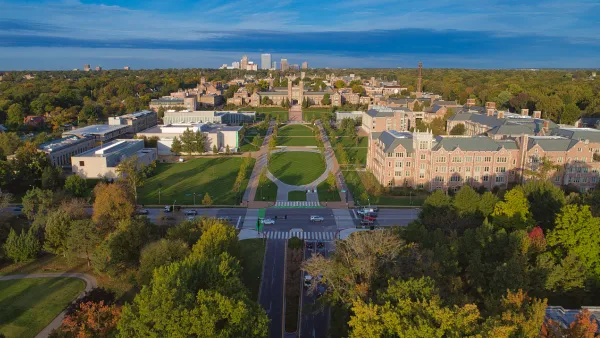The Young Scientist Program (YSP) at WashU works with local public schools to promote science education and science literacy for students from all levels and backgrounds. YSP is run by graduate students from across WashU. The current YSP director, Chanez Symister, is a graduate student in the Department of Chemistry in Arts & Sciences.

How was YSP started?
Two MD/PhD students started the program in 1991, and it’s been handed down from grad student to grad student ever since. YSP is something we (graduate students and medical students) can take pride in. It gives us a way to give back, and it makes us an active part of the community. A lot of schools in the St. Louis area don’t have the facilities that WashU does. YSP lets us get out into the city and help while also taking a breather from the day-to-day pressures of graduate school, which can be isolating.
Though most YSP volunteers are graduate students, we also have postdocs, technicians, and staff scientists who actively volunteer.
What kinds of support does YSP offer local schools?
The Young Scientist Program has three main components: Continuing mentoring, summer focus, and teaching teams. YSP also builds and maintains teaching kits, which contain everything teachers need to do in-class science demos.

You’ve got a lot going on! Let’s dig into each of those. Tell me more about the teaching kits.
The teaching kits are actually the smallest part of what we do, from a volunteer perspective. YSP creates demos for teachers in small packets with worksheets and everything else they’ll need to do the lesson. Teachers can request a demo and then come pick it up from our campus free of charge. For the most part, teachers choose from set kits. Say there’s a certain topic a teacher might not have an activity for or something students typically struggle with, we probably have a kit for that. But, depending on the topic, YSP will develop new kits within reason and within safety considerations.
So, if a particular topic wouldn’t work for a teaching kit because it’s too complex or too dangerous, then what happens?
Then we can send a teaching team to do a live demo. YSP typically visits schools within a 20-mile radius, but sometimes we’ll go farther afield, even into Illinois. Our main focus, though, is supporting the St. Louis community.
We also facilitate field trips to both campuses, so students can experience demos here and tour academic and research labs as well as the different facilities our campuses have to offer.

What about the last two components, continuing mentoring and summer focus?
Our big thing is continuing mentoring. We pair up a graduate student with a high school freshman, and we stay with them through their whole high school career, from freshman to senior year. The first two years are basically building a relationship with your mentee and trying to get them interested in science. They might ask you as a mentor, “I don’t get this homework; can you help me?” We help with that sort of thing as well as with just high school problems. We’ve all been there!
Along the way, we always throw in a little bit of science, like, “Hey, did you see this cool science video? We should watch it together.” Or, “How about we go to the park and try out this new demo we saw online?” We’re always trying to build that awareness of science.
Once we build that awareness, by the end of the second year usually, then we can do more with our mentees. We like to do fun demos with them in labs here on campus to show them that they can do science. We want to get them thinking, “I can do science; a science career is something that’s an option for me.” Then, in the junior and senior years, we work with them on applying for internships, doing college and ACT prep, and preparing college applications and cover letters. It’s amazing to see them from start to finish, seeing them start out as freshman, then go all the way through applying for college and sending them off into the world.

And summer focus? That’s recently wrapped up, right?
Summer focus is an eight-week summer internship program. Several labs across campus participate in summer focus by welcoming a local high school student, usually a rising senior, into their lab group for the duration of the program. Like continuing mentoring, summer focus gives students a chance to realize for themselves that scientific research is something they can do. They get that eye-opening experience as they start looking at colleges, and that might even guide their college choices.
During their eight weeks in the lab over the summer, we give each student two mentors. One is a lab mentor they’re working with throughout the day, and the second is their background literature mentor who helps them learn to read scientific papers and other research material. To get students ready, we have a boot camp before summer focus where students learn basic lab skills, such as pipetting and growing media, and basic scientific writing skills. Summer focus scholars also take volunteer-led college prep and scientific writing classes.
Beyond building fundamental lab skills, summer focus students also prepare a scientific report about their research to be presented at an end-of-summer symposium. This gives them a chance to take ownership of their work and showcase what they’ve accomplished.

Visit YSP's website or contact Chanez Symister to learn more about how you can get involved with the Young Scientist Program. While most YSP volunteers are graduate students, YSP also welcomes postdocs, staff scientists, and technicians as volunteers and offers opportunities for PIs and other staff members to support the program.
YSP gratefully acknowledges the generous support of foundation and individual sponsors.

